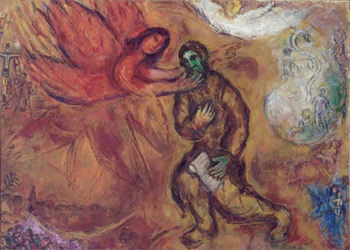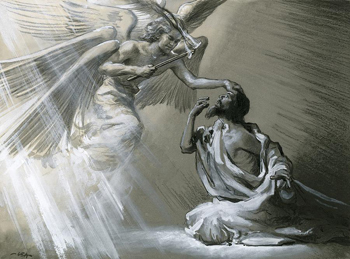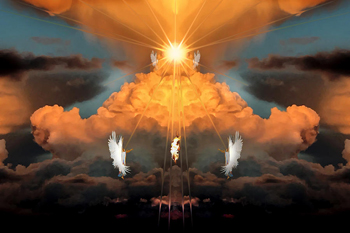For Sunday February 6, 2022
Lectionary Readings (Revised Common Lectionary, Year C)
Isaiah 6:1-8, (9-13)
Psalm 138
1 Corinthians 15:1-11
Luke 5:1-11
NOTE: This essay focuses on Isaiah 6. For a reflection on this week’s Gospel, see “Same Old Same Old” from the JwJ archives.
Six-winged serpents with eerie voices. Trembling thresholds and smoke-filled rooms. A robe so vast, its hem overflows a temple. Is this scripture? Or a scene from a sci-fi movie?
The story of Isaiah’s prophetic call is one of the most cinematic stories in the Bible, and at first glance, it might seem inaccessible. After all, most of us don’t see flying seraphs when we pray, or receive absolution via tongs and live coals. In fact, I suspect some of us read theophany stories in scripture (stories of divine manifestation), and walk away feeling wary, wistful, or envious. Why don’t we get to see and hear God in such concrete ways? In what sense are Biblical theophanies “real?” What role should mystical experience play in our 21st-century faith lives? If God were to appear to us in such dramatic fashion, would we respond with gratitude? Or fear for our mental health?
I don’t have black-and-white answers to these questions, but I do think that Isaiah’s vision is worth wrestling with, anyway. As I’ve spent time with the reading this week, here’s some of what I’ve noticed, appreciated, and pondered:
Do I really believe in a God of the encounter? “In the year that King Uzziah died,” writes Isaiah, “I saw the Lord.” Isaiah’s experience of God is grounded in the details of his context and history. At a particular instant, in a specific moment of cultural, political, and social upheaval in Isaiah’s life, he encounters God. A king — one of the overall better ones in Judah’s history — has died in disgrace, leaving Isaiah reeling. What will happen now? How will God's people fare, going forward? Where should they look for hope, guidance, and help, as their socio-political horizon grows dim?
 |
In other words, Isaiah experiences God’s presence in a time of absence. He encounters the divine when there’s nothing else to lean on, and nowhere else to go. God enters the gap, fills the void, and speaks into the silence that human frailty leaves behind.
As we look at our own contexts — personal, cultural, political, global — I wonder if we can say what Isaiah says. “In the year that my father died. In the months after my church closed its doors. In a season when my national leaders disappointed me. In those days when Covid broke our hearts. As we watched the climate crisis worsen. Inside the void of my sin, sorrow, and brokenness. In a time of crisis, hysteria, absurdity, and chaos, I saw the Lord.”
In my own faith life, I worry that I don't lean hard enough into the possibility of encounter. Sure, I believe in a God who wants me to love, serve, hope, and do justice. But I don't always believe in a God who desires to meet me. A God who might actually show up if I dare to live mystically. That is, if I dare to prioritize those practices — silence, contemplation, rest, and meditation — that open my heart to real engagement with the divine.
Maybe I hesitate because I fear disappointment. Or maybe I just plain don't make the time because I'm busy. Either way, Isaiah's story invites me to reconsider. It invites me to ask, seek, trust, and anticipate.
No, we might not see wings, thrones, or tongs when God appears. But the witness of both scripture and history is consistent in promising us that our God is a God of the encounter. God appears, God speaks, God reveals, and God hears. Our task is not so much to yearn for the cinematic and the spectacular — though I wouldn’t rule anything out when it comes to God — but to look for the sacred in the specific details of our lives. Not just in the pretty details, but in the messy ones as well. Sometimes, it’s when “king Uzziah” dies — when our heroes fail, our foundations tremble, and our resources dry up — that we see the Lord.
 |
Do I recognize that worship is dangerous? In her provocative book, Teaching a Stone to Talk: Expeditions and Encounters, Annie Dillard asks a spot-on question about the expectations we bring to worship: “Does anyone have the foggiest idea what sort of power we blithely invoke? Or, as I suspect, does no one believe a word of it? The churches are children playing on the floor with their chemistry sets, mixing up a batch of TNT to kill a Sunday morning. It is madness to wear ladies’ straw hats and velvet hats to church; we should all be wearing crash helmets. Ushers should issue life preservers and signal flares; they should lash us to our pews. For the sleeping god may wake someday and take offense, or the waking god may draw us to where we can never return.”
Isaiah enters the temple to worship — and the cosmos splits wide open. A human house of brick, wood, mortar, and stone becomes a throne room, “high and lofty.” The thin space of the ordinary expands until the presence of God — the mere hem of God’s clothing — fills every corner, every nook. Isaiah experiences the grandeur of God so powerfully, he cries out — not in joy, but in awe, fear, and even despair: “Woe is me! I am lost, for I am a man of unclean lips, and I live among a people of unclean lips; yet my eyes have seen the King, the Lord of hosts!”
As Christians, we rightly hold God’s otherness and God’s closeness (God’s transcendence and God’s immanence, to use more “churchy” words) in tension, trying our best to honor both. But I wonder sometimes if I lean so hard into God as counselor and friend, that I forget God’s vast and mysterious otherness. I forget the distance between God's holiness, and my sin. The God Isaiah sees is not “safe.” The emotions Isaiah experiences aren’t comfortable. The forgiveness Isaiah receives is not painless.
Would we take worship, prayer, and confession more seriously if we trusted the raw and brutal power of Isaiah’s vision? How would I respond if a seraph brought a live coal to my lips? Do I really want my sinfulness cauterized? Am I as open to costly transformation as Isaiah is in this story? How carelessly or reverently do I walk into church and sing, “Holy, holy, holy” on Sunday mornings? Would I walk the planet differently if I really believed the seraph’s declaration that “the whole earth is full of God’s glory?"
To say that worship is dangerous is not to say that it’s harmful. On the contrary, what’s remarkable about Isaiah's vision is the tension it so beautifully illustrates. The same God whose robe fills the temple, the same God the seraphs can’t bear to gaze upon — condescends to Isaiah, forgives Isaiah, and invites Isaiah to participate in sacred, world-changing work. It’s because Isaiah stands in right relationship to God’s transcendence that he learns to savor God’s loving closeness. It’s because he recognizes his vast unworthiness that he receives the hot coal of grace as a gift, not as torture.
 |
Do I know how to measure success? To put it bluntly, Isaiah’s vision doesn’t end on a high note. He doesn’t walk away celebrating. In fact, I imagine he walks away startled, pensive, and bewildered, not knowing what to make of the thankless vocation God gives him.
After Isaiah receives absolution, he hears God’s ringing call: “Whom shall I send? Who will go for us?” Freshly forgiven and zealous to serve, Isaiah responds with enthusiasm: “Here am I! Send me!”
The poor guy. I can almost see him, dancing on tiptoe, all dignity forgotten, his hands waving frantically in the air: “Me! Me! Oh please God, choose me!”
Well, God chooses him, all right. God chooses him to preach to people who will not listen. God asks him to speak in ways that “make the mind of the people dull, and stop their ears, and shut their eyes.” God commissions the prophet to prophesy “until cities lie waste," emptiness fills the land, and “the Lord sends everyone far away.”
If you’re not flinching, you should be, because this is not the kind of ministry any of us would choose. This is truth-telling so pointed, so radical, so raw, and so consequential, it defies every measure of success our culture knows and respects. This is discerning work. Incisive work. The work of judgment in its best sense — judgment as perception, as vision, as clarity. How many of us are brave enough for this work? How many of us dare to talk about sin, brokenness, and evil, knowing it will cause offense? How many of us trust that God might still remain faithful, active, and engaged in our lives if the people we serve walk away?
The promise that ends Isaiah’s vision isn’t the promise of a packed out mega-church. It’s not a promise of prosperity or popularity. It’s the promise of a “stump.” A remnant. A “holy seed.” It’s the promise of not much — but exactly enough.
There’s a price to pay when we say “yes” to God. There’s a recalibration of success we have to make when we accept the divine call and say, “Send me.” What matters after the “yes” is strange and countercultural. What matters is integrity. Truthfulness. Long-suffering. Patience. What matters is believing wholeheartedly in the divine economy of stumps and seeds. Because this is how God works. This is how God measures success. Out of the tiny, the hidden, and the barely discernible, God’s life springs. The wasteland becomes the garden. The stump becomes a mighty tree. God takes the palette of dread and desolation, and turns it riotous with color.
It might not happen soon. We might not see it in our lifetimes. But the vision remains, and its promise sustains, enlivens, and fills us. Dare we trust the God of mere seeds?
Isaiah sees the Lord, and everything changes in the wake of that seeing. The changes aren’t easy, safe, or uniformly comforting. But they are good. May our seeing and our changing be for good, too.
Debie Thomas: debie.thomas1@gmail.com
Image credits: (1) Bible Odyssey; (2) Fine Art America; and (3) Fine Art America.





